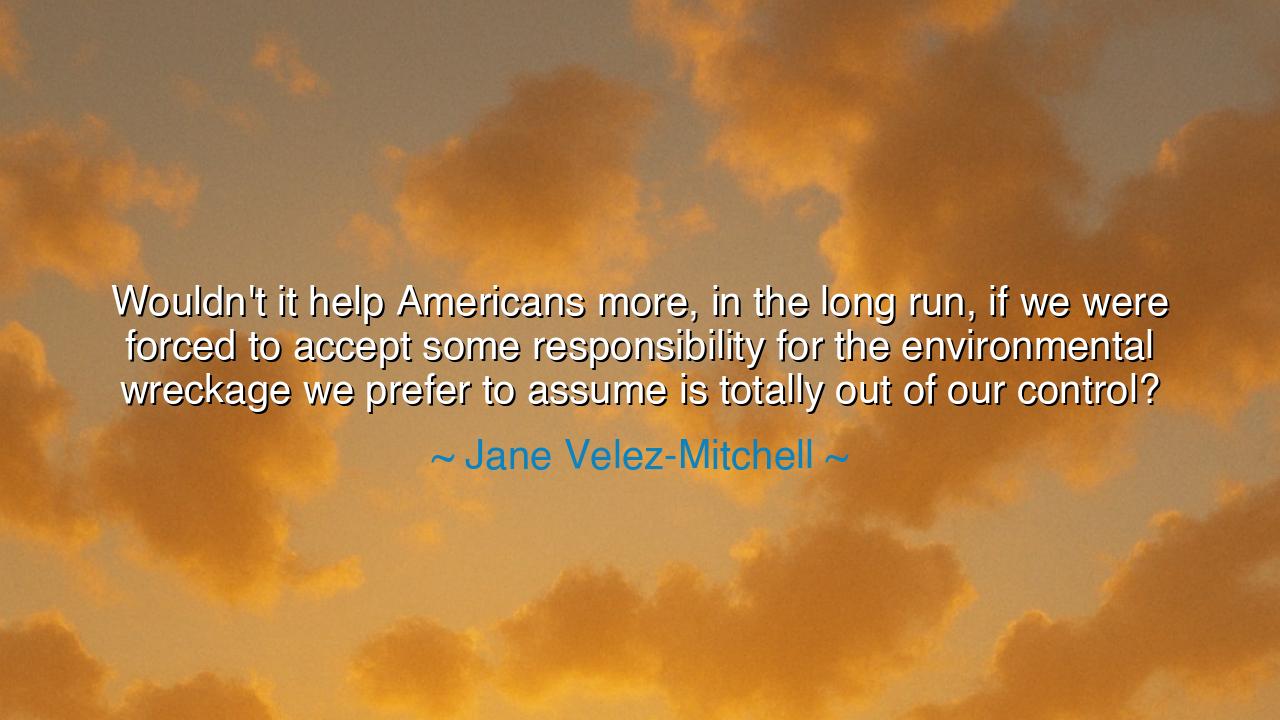
Wouldn't it help Americans more, in the long run, if we were
Wouldn't it help Americans more, in the long run, if we were forced to accept some responsibility for the environmental wreckage we prefer to assume is totally out of our control?






Hear the sharp words of Jane Velez-Mitchell, who cast a mirror before her people and asked: “Wouldn’t it help Americans more, in the long run, if we were forced to accept some responsibility for the environmental wreckage we prefer to assume is totally out of our control?” This question, though framed as a challenge, carries the weight of prophecy. It demands that we cease hiding behind excuses and illusions, and instead acknowledge that the ruin of the earth is not fate, not chance, but the fruit of our own hands.
For how often do men and women say, “It is out of my control”? They see storms, fires, polluted rivers, melting glaciers, and shrug as if they were powerless before the gods. But the truth Velez-Mitchell reveals is that much of this environmental wreckage flows not from divine wrath but from human appetite: forests felled for profit, oceans stripped by nets, skies darkened by our engines. To claim helplessness is to escape responsibility, and to escape responsibility is to invite deeper ruin.
History bears witness to this pattern. In the once-great lands of Mesopotamia, over-irrigation and salinization poisoned the soil. Farmers might have blamed the heavens, but it was their own relentless plowing and neglect of balance that made the earth barren. Likewise, on Easter Island, people cut down their forests until none remained, toppling their own future. In both cases, ruin came not because fate decreed it, but because humans refused to take responsibility for the destruction they themselves had wrought.
Yet there are also stories of redemption, where responsibility was accepted and ruin reversed. In the 20th century, the Cuyahoga River in Ohio caught fire from pollution—a shame so great it could not be ignored. At last, the people and their leaders admitted the truth: they were the cause. Laws were passed, industries restrained, and the river was healed. Here we see Velez-Mitchell’s wisdom proven: when people are forced to accept responsibility, healing begins, and what once burned can flow with life again.
Her words, though spoken to Americans, hold universal meaning. For each nation, each people, has the temptation to look away, to believe that one person’s actions are too small to matter. But she reminds us that denial, multiplied across millions, is itself the greatest danger. To say “It is not my fault” is to surrender the future; to say “I will take responsibility” is to begin its salvation.
The lesson is clear: we cannot be mere spectators of the earth’s decline. Responsibility must be accepted, even when it burdens us, even when it costs us. Each must examine their habits—how they eat, how they travel, how they consume—and ask, “Does this heal, or does this wound?” Each must demand of leaders not only words but action, not only profit but preservation. For the earth is not a possession to be squandered; it is an inheritance to be guarded.
Therefore, O listener, let these words dwell in your heart: do not assume that ruin is beyond your control. Acknowledge your part, however small, in the fate of the land, the water, and the air. Teach your children that responsibility is not a curse but a gift, for only those who claim responsibility can shape destiny. Plant, conserve, protect, and speak, that future generations may inherit not ashes, but abundance.
So let the question of Jane Velez-Mitchell echo across time: Wouldn’t it help us more, in the long run, if we were forced to accept responsibility? Yes—it would save not only the earth, but our own souls. For in accepting responsibility, we awaken the power to change, and in that awakening lies the hope of tomorrow.






AAdministratorAdministrator
Welcome, honored guests. Please leave a comment, we will respond soon